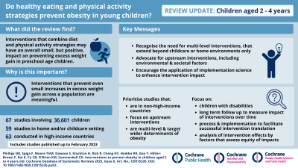News
Combining diet and activity strategies may prevent obesity in young children

New Fuse research published today (11 June, 2025) in a Cochrane Review has found that combining dietary and activity strategies may help prevent obesity in children aged 2 to 4 years.
The study, co-authored by Fuse researchers, found that children supported with a combined approach of improving both diet and physical activity may have a slightly reduced body mass index (BMI) compared to those receiving no intervention. While the difference is small, it is meaningful at the population level and underscores the importance of early preventative action.
Lead author Dr Sophie Phillips, former Fuse Phd student at Durham University, funded through the NIHR School for Public Health Research, said:
"Our research highlights the importance of combining dietary and activity strategies to help prevent excess weight during early childhood, whilst showing that strategies focusing on just one of these factors in isolation are less effective."
The authors reviewed 67 studies involving over 36,000 children and found that strategies delivered in home or childcare settings were most common. However, interventions that focused on either diet or physical activity alone did not show the same potential to reduce BMI.

Tackling a growing health inequality
Globally, rising rates of childhood obesity - especially among the youngest children - are increasingly tied to social and economic inequalities. Living with overweight or obesity in early childhood can lead to both physical and psychological health challenges, and children who experience obesity are more likely to carry this into adulthood.
The researchers emphasise the need for future prevention strategies to look beyond individual behaviour and consider broader systemic and environmental factors.
"We therefore call for future obesity intervention to address the broader determinants of health, to ensure that all children are afforded the opportunities to benefit from both a healthy diet and regular physical activity," added Dr Phillips.
The review found no evidence that these interventions are less effective in children from lower socio-economic backgrounds, indicating potential for equitable impact when strategies are delivered early.
A call for a new research approach
The team recommends a shift in obesity prevention research towards multilevel, community-based interventions that consider the structural drivers of health, such as income, food access, and the built environment.
They also highlight the role of the research community in supporting policymakers by synthesising evidence in ways that are accessible, actionable, and aligned with real-world public health needs.
Sophie’s journey through Fuse
Dr Sophie Phillips began her research career as a Fuse PhD student, funded through the NIHR School for Public Health Research (SPHR). She was supervised by Professor Carolyn Summerbell (Durham University, Fuse Associate Director) and Dr Frances Hillier-Brown (Newcastle University, Fuse Associate).
After completing her PhD, bridging funding through Fuse's membership to SPHR, has enabled Sophie to contribute to this Cochrane Review and other key projects.
She is now a Postdoctoral Associate in the Child Health and Physical Activity Lab at Western University in Canada and was recently awarded a three-year personal fellowship from the Canadian Institutes of Health Research (CIHR).
Read the full review: Interventions to prevent obesity in children aged 2 to 4 years old
Last modified: Fri, 11 Jul 2025 15:01:52 BST






